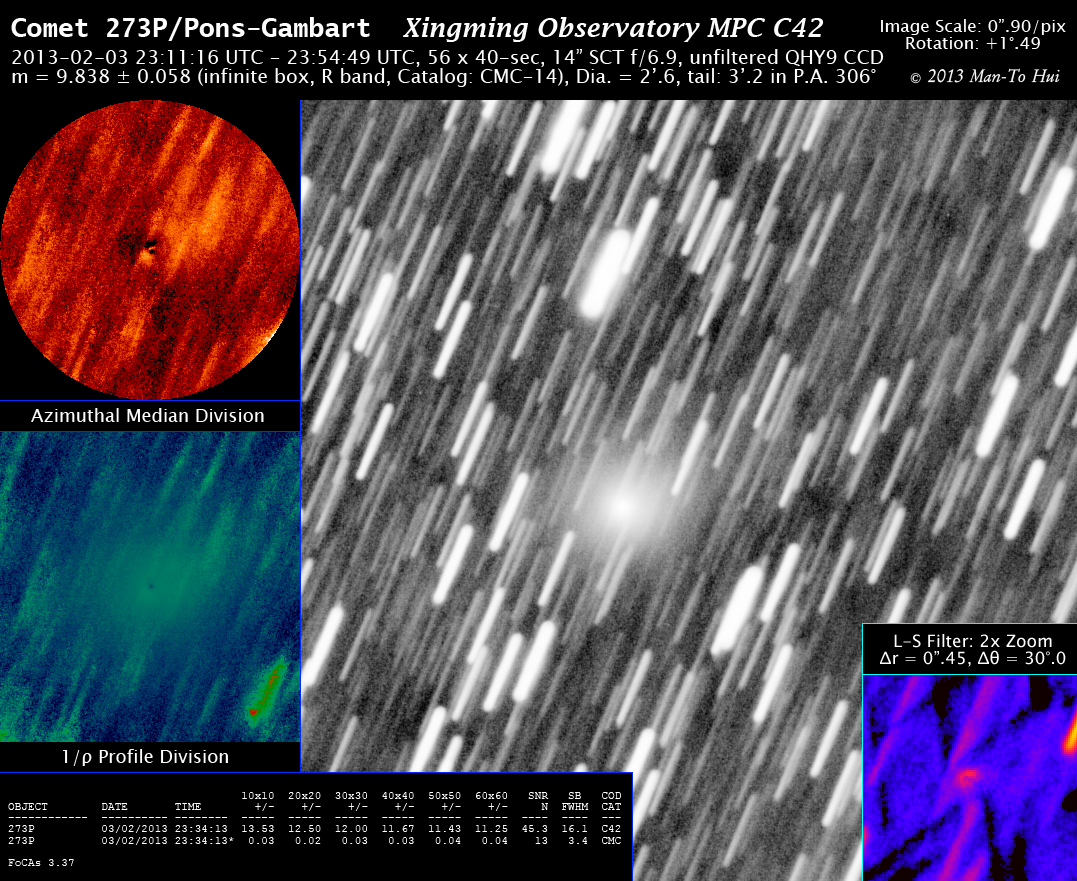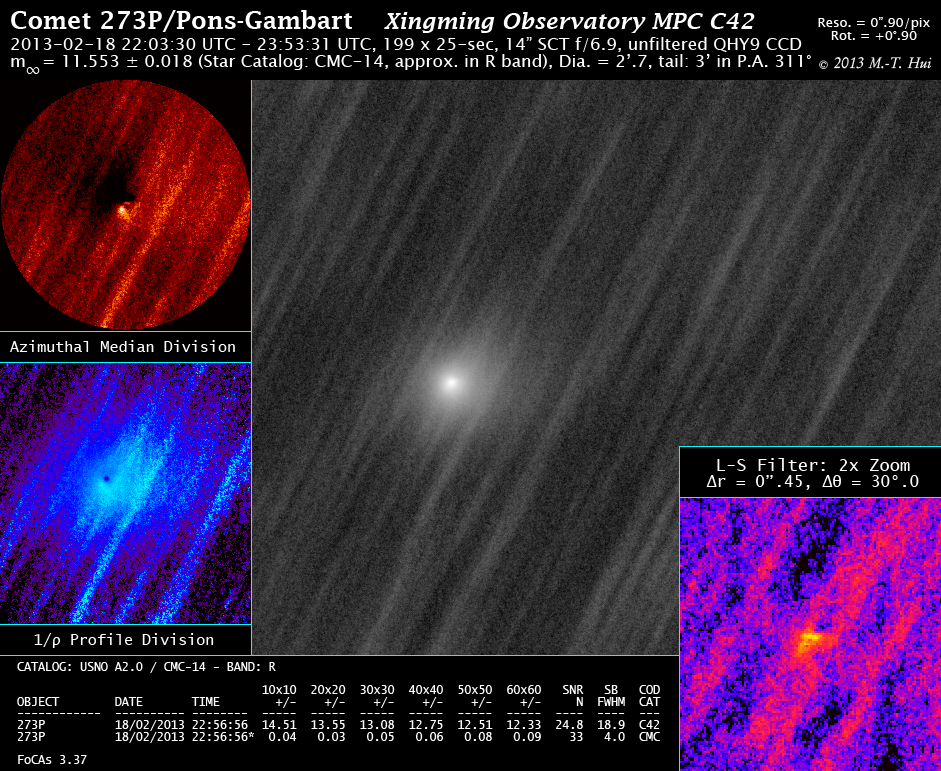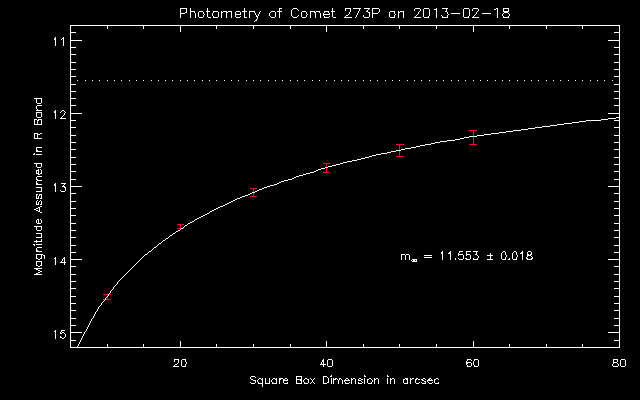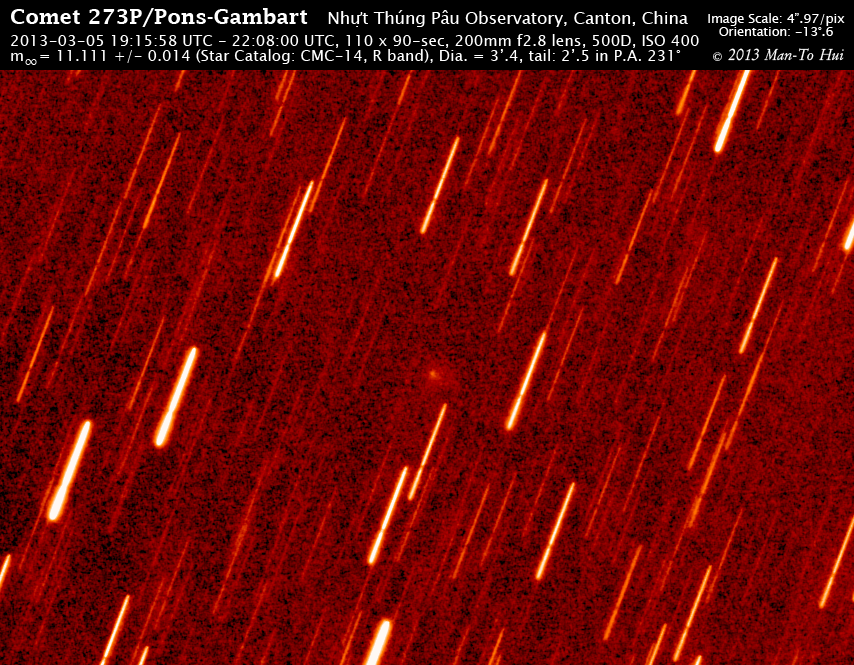Comet
273P/Pons-Gambart
This comet was first reported by
Robert D. Matson (Newport Coast, California, US) in SAWN imagery from Nov 2012.
Terry Lovejoy (Thornsland, Queensland, Australia) managed to capture the comet
on Nov 29.4 UT 2012 from ground-based, apparent diameter around 2', 10th
magnitude. On Nov 30.4 UT 2012, Robert H. McNaught from Siding Spring confirmed
the discovery through the 0.5-m Uppsala Schimdt. A 6' tail in P.A. 101° was also
identified. However, it was not the ned of the story. Maik Meyer (Limburg,
Germany) suggested the similarity between the orbit of the new comet and that of
D/1827 M1 (Pons-Gambart). Syuichi Nakano (Somoto, Japan) attempted to establish
the linkage, however, the residual was enormous provided that the orbital period
is around half of a century. The comet was thereby designated C/2012 V4. More
observations proved that the period is actually much longer than previously
expected. Finally MPC announced the comet as 273P/2012 V4 (Pons-Gambart).
2013/02/03
2013/02/18
2013 Feb 03
|
The final
image was stacked in average method. Alas the focus was not
accurate.
Mouse-over to
browse the images without special cometary processing techniques attached.
Except the
image processed by L-S filter, azimuthal median method and
radial weighted method were applied to a final image stacked in
median method.
|
MPC observation computed with Astrometrica
using both UCAC-4 and CMC-14 star catalogs -- the former for astrometric
reduction and the latter for photometric work:
COD C42
OBS X.Gao, M.-T. Hui
MEA M.-T. Hui
TEL 0.36-m f/6.9 Schmidt-Cassegrain + CCD
NET UCAC-4
0273P KC2013 02 03.96889 18 27
59.49 +06 50 54.6
13.6 N C42
0273P KC2013 02 03.97108 18 27
59.31 +06 50 59.1
13.5 N C42
0273P KC2013 02 03.97328 18 27
59.20 +06 51 03.9
13.5 N C42
0273P KC2013 02 03.97550 18 27
59.11 +06 51 08.1
13.5 N C42
0273P KC2013 02 03.97770 18 27
58.97 +06 51 12.7
13.5 N C42
0273P KC2013 02 03.97988 18 27
58.88 +06 51 17.8
13.5 N C42
0273P KC2013 02 03.98207 18 27
58.69 +06 51 21.0
13.6 N C42
0273P KC2013 02 03.98428 18 27
58.60 +06 51 27.2
13.6 N C42
0273P KC2013 02 03.98649 18 27
58.49 +06 51 32.0
13.6 N C42
0273P KC2013 02 03.98868 18 27
58.36 +06 51 35.9
13.5 N C42
0273P KC2013 02 03.99088 18 27
58.28 +06 51 40.4
13.5 N C42
0273P KC2013 02 03.99307 18 27
58.20 +06 51 44.7
13.5 N C42
0273P KC2013 02 03.99553 18 27
58.05 +06 51 49.8
13.5 N C42
Photometry result computed with FoCAs,
which processes images based upon the .LOG file of Astrometrica, by means of
Multibox method:
-
COD
C42
OBS X.Gao, M.-T. Hui
CATALOG: USNO A2.0 / CMC-14 - BAND: R
10x10 20x20 30x30 40x40 50x50 60x60
SNR SB COD
OBJECT DATE
TIME +/- +/-
+/- +/- +/- +/-
N FWHM CAT
------------ ---------- -------- ----- -----
----- ----- ----- ----- ---- ----
---
273P 03/02/2013
23:34:13 13.53 12.50 12.00 11.67 11.43
11.25 45.3 16.1 C42
273P 03/02/2013
23:34:13* 0.03 0.02 0.03 0.03
0.04 0.04 13 3.4 CMC
FoCAs 3.37
www.astrosurf.com/cometas-obs
es.groups.yahoo.com/group/Cometas_Obs
-
-
Interpretation of the FoCAs table
headings:
Fisrt line:
OBJECT, DATE, TIME: refering to their original meanings
respectively
10x10, 20x20 ... 60x60: the aperture
sizes of photometry in term of rectangle in arcsec that are used to
measure an object's magnitude
SNR: the Signal-to-Noise Ratio for
aperture photometry
SB: stars of faintest magnitude on the
images used in data reduction with the used star catalog in
Astrometrica, rather than the stars of faintest magnitude in the
images
COD: MPC Code of the observatory
Second line:
+/-:
precisions of measurement
N: the number of used images for
measurement
FWHM: Full-Width-Half-Maximum of total
PSF, relevant to degree of seeing
CAT: the used star catalog in
Astrometrica
-
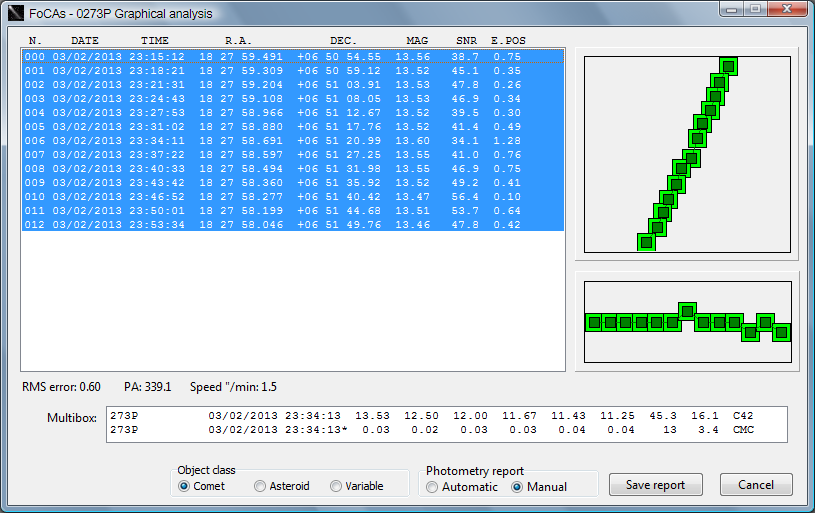
The following is the plot of the magnitude enclosed by different square
aperture boxes. The magnitude enclosed by infinite box was also calculated by
the following equation:
$ m\left ( r \right )=m_\infty -2.5\log \left [ 1-\exp \left (
-\frac{r}{\rho} \right ) \right ] $,
where $ r $ is the radius of some aperture, $\rho $ is the apparent radius of
the coma, and $ m_\infty $ is the magnitude obtained by an infinite aperture. In
this case, I obtained $ m_\infty = 9.838 \pm 0.058 $, as it were measured by an
infinite square box, which is consistent with
what recent visual observers estimated.
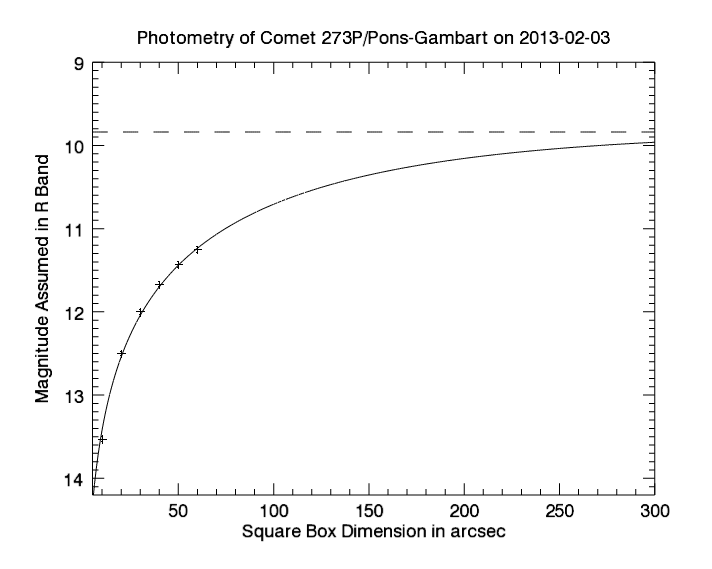
Copyright @ Man-To
Hui
2013/02/07
2013 Feb 18
|
The final
image was stacked in median method.
A jet feature
is clearly visible in all of the three special-processed images,
whereby ought to be authentic instead of artificial.
Mouse-over to
browse the images without special cometary processing techniques attached.
|
MPC observation computed with Astrometrica
using both UCAC-4 and CMC-14 star catalogs -- the former for astrometric
reduction and the latter for photometric work:
COD C42
OBS M.-T. Hui, X. Gao
MEA M.-T. Hui
TEL 0.36-m f/6.9 Schmidt-Cassegrain + CCD
NET UCAC-4
0273P KC2013 02 18.92000 18 10
59.06 +16 43 18.8
14.5 N C42
0273P KC2013 02 18.92189 18 10
58.84 +16 43 23.7
14.5 N C42
0273P KC2013 02 18.92378 18 10
58.66 +16 43 29.4
14.5 N C42
0273P KC2013 02 18.92567 18 10
58.50 +16 43 34.7
14.5 N C42
0273P KC2013 02 18.92757 18 10
58.31 +16 43 39.9
14.6 N C42
0273P KC2013 02 18.92946 18 10
58.14 +16 43 45.5
14.4 N C42
0273P KC2013 02 18.93135 18 10
57.97 +16 43 50.6
14.4 N C42
0273P KC2013 02 18.93325 18 10
57.84 +16 43 56.0
14.5 N C42
0273P KC2013 02 18.93515 18 10
57.63 +16 44 01.6
14.5 N C42
0273P KC2013 02 18.93705 18 10
57.44 +16 44 06.0
14.5 N C42
0273P KC2013 02 18.93894 18 10
57.25 +16 44 12.7
14.6 N C42
0273P KC2013 02 18.94083 18 10
57.08 +16 44 17.7
14.5 N C42
0273P KC2013 02 18.94274 18 10
56.91 +16 44 22.3
14.5 N C42
0273P KC2013 02 18.94464 18 10
56.71 +16 44 27.3
14.5 N C42
0273P KC2013 02 18.94654 18 10
56.52 +16 44 33.4
14.6 N C42
0273P KC2013 02 18.94844 18 10
56.37 +16 44 38.4
14.5 N C42
0273P KC2013 02 18.95413 18 10
55.86 +16 44 54.5
14.5 N C42
0273P KC2013 02 18.95604 18 10
55.66 +16 44 59.9
14.5 N C42
0273P KC2013 02 18.95795 18 10
55.47 +16 45 04.5
14.5 N C42
0273P KC2013 02 18.95985 18 10
55.27 +16 45 10.2
14.5 N C42
0273P KC2013 02 18.96282 18 10
55.14 +16 45 15.3
14.5 N C42
0273P KC2013 02 18.97427 18 10
54.03 +16 45 48.3
14.5 N C42
0273P KC2013 02 18.97617 18 10
53.85 +16 45 53.4
14.5 N C42
0273P KC2013 02 18.97808 18 10
53.69 +16 45 59.0
14.6 N C42
0273P KC2013 02 18.97999 18 10
53.52 +16 46 03.6
14.5 N C42
0273P KC2013 02 18.98191 18 10
53.35 +16 46 10.1
14.5 N C42
0273P KC2013 02 18.98381 18 10
53.11 +16 46 14.7
14.5 N C42
0273P KC2013 02 18.98572 18 10
52.95 +16 46 20.6
14.5 N C42
0273P KC2013 02 18.98763 18 10
52.79 +16 46 25.1
14.4 N C42
0273P KC2013 02 18.98953 18 10
52.60 +16 46 31.2
14.5 N C42
0273P KC2013 02 18.99144 18 10
52.38 +16 46 36.6
14.5 N C42
0273P KC2013 02 18.99334 18 10
52.18 +16 46 42.6
14.4 N C42
0273P KC2013 02 18.99487 18 10
52.07 +16 46 46.2
14.4 N C42
Photometry result computed with FoCAs,
which processes images based upon the .LOG file of Astrometrica, by means of
Multibox method, can be visited in the above image.
Interpretation of the FoCAs table
headings:
Fisrt line:
OBJECT, DATE, TIME: refering to their original meanings
respectively
10x10, 20x20 ... 60x60: the aperture
sizes of photometry in term of rectangle in arcsec that are used to
measure an object's magnitude
SNR: the Signal-to-Noise Ratio for
aperture photometry
SB: stars of faintest magnitude on the
images used in data reduction with the used star catalog in
Astrometrica, rather than the stars of faintest magnitude in the
images
COD: MPC Code of the observatory
Second line:
+/-:
precisions of measurement
N: the number of used images for
measurement
FWHM: Full-Width-Half-Maximum of total
PSF, relevant to degree of seeing
CAT: the used star catalog in
Astrometrica
-
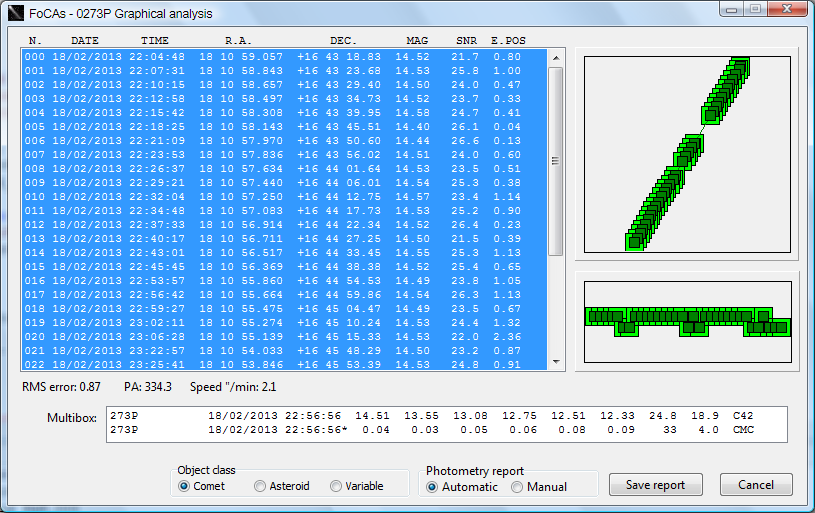
The following is the plot of the magnitude enclosed by different square
aperture boxes. The magnitude fitting function is modified as follows:
$ m\left ( r \right )=m_\infty -2.5\log \left [ 1-\exp \left (
- \left ( \frac{r}{\rho} \right ) ^n \right ) \right ] $,
where $ n $ is a parameter related to the shape of the coma. When $ n=1.28 $ the residual decreased to the least. Hence $ m_ \infty = 11.553 \pm 0.018
$, in good accordance with reports from visual observers.
Copyright @ Man-To
Hui
2013/02/21
2013 Mar 05
|
For color
version please pay a visit to this
page.
As the
resolution and SNR of this comet is insufficient, there is no
cometary-processing.
|
Only photometric work has been performed with this session
of observation. It is my first personal successful observation of the comet as
well. The catalog used is CMC-14.
Radius of aperture 0 = 3.0
Radius of aperture 1 = 6.0
Radius of aperture 2 = 9.0
Radius of aperture 3 = 12.0
Radius of aperture 4 = 15.0
Radius of aperture 5 = 18.0
Radius of aperture 6 = 21.0
Radius of aperture 7 = 24.0
Radius of aperture 8 = 27.0
Inner radius for sky annulus = 30.0
Outer radius for sky annulus = 45.0
Sky SkySig SkySkw
Magnitudes
8885.34 21.20 0.09
14.075+-0.029 13.070+-0.022 12.540+-0.020
12.188+-0.019 11.963+-0.020 11.780+-0.021
11.609+-0.021 11.499+-0.023 11.414+-0.025
I applied my IDL routine for calculating the infinite
aperture magnitude of this comet. I obtained $ m_ \infty = 11.111 \pm 0.014$, a good match to results from visual observations during
this time.
Copyright @ Man-To
Hui
2013/03/
18
Feel free to e-mail
me with any doubts or questions.
Top
Back...
-- Zurück...
Home
